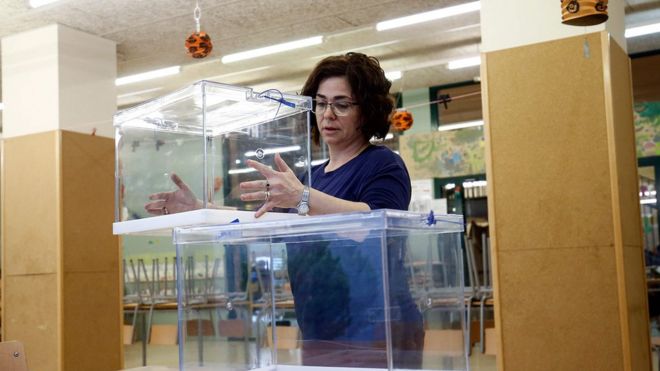 |
| Polling stations are expecting a high turnout |
Polls are due to open across Catalonia in a closely watched regional election called by Spain following October's controversial independence referendum.
The snap election pits parties who want Catalonia to be an independent republic against those who wish it to remain a semi-autonomous part of Spain.
All indications are that the result will be very close.
A BBC correspondent says there seems little prospect that the election will solve the region's political crisis.
The Spanish daily El Pais said on its front page on Wednesday that one million undecided voters could have the last word.
An aggregate of polls published earlier this week by El Pais suggests the pro-independence Republican Left of Catalonia (ERC) will come top, slightly ahead of Ciudadanos (Cs), which wants unity with Spain.
The pro-independence JxCat party of ousted Catalan President Carles Puigdemont was predicted to come third. That would mean no parliamentary majority in favour of independence and possibly lengthy negotiations to form a government.
The BBC's Kevin Connolly in Barcelona says there is every prospect that the two sides in the independence debate will once again end up with a similar share of the vote and the election will restate Catalonia's problem rather than resolve it.
Separatists who dominated the Catalan parliament declared independence on 27 October after a controversial referendum described as illegal by Madrid.
Spanish Prime Minister Mariano Rajoy then sacked the Catalan government, imposed direct rule and called the 21 December election.
- Catalonia's quarrel with Spain explained
- Muslim woman seeks seat in Catalonia
- Catalonia region profile
Prosecutors accused 13 Catalan separatist politicians of rebellion and sedition, including Mr Puigdemont and four others who fled to Belgium.
Other pro-independence politicians are in Spanish prisons.
As a result, campaigning has led to some unusual scenes, with Mr Puigdemont addressing rallies via a videolink from Brussels.
His former deputy, Oriol Junqueras, has sent messages to supporters from inside prison.
In the run-up to the referendum Mr Puigdemont's JxCat party had been allied to the ERC, led by Mr Junqueras.
But the ERC has opted out of a new alliance making Mr Junqueras the main separatist rival to Mr Puigdemont.
In a recent veiled jibe at Mr Puigdemont, Mr Junqueras said he was in jail "to face the consequences" and because "I don't hide from my actions".
Some voters expressed their concerns for the future.
"I think many positions have become very extreme," said Assumpta Corell, 21, a university student from Castelldefels who said she would vote for the centrist, pro-unity party Ciudadanos.
"People who have one opinion will maintain it, people who have a different opinion will continue thinking differently, which is great, but the problem comes when politics plays at dividing people even more."
Musician Marc Botey, 47, said he would be voting for the ERC but was "anticipating problems, whoever wins".
He said he hoped the election would at least clarify how many independence supporters there are in Catalonia.
Source:
BBCNews

No comments:
Post a Comment
Add a Comment...